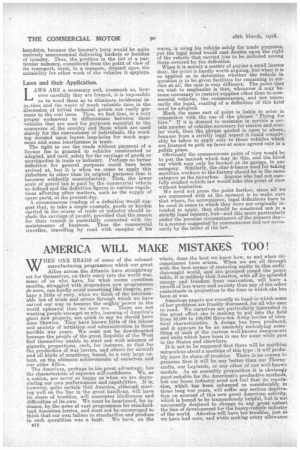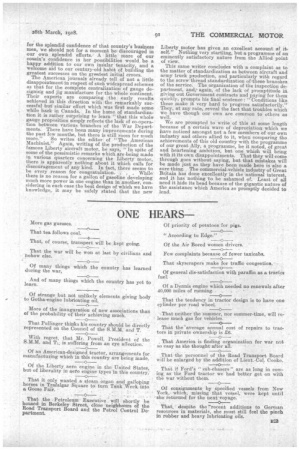AMERICA WILL MAKE MISTAKES TOO!
Page 2

Page 3

If you've noticed an error in this article please click here to report it so we can fix it.
WHEN ONE READS of some of the colossal manufacturing programmes which our great Allies across the Atlantic have straightway set for themselves, on their entry into the world war, some of us who have, for what seems countless months, struggled with stupendous new programmes de novo, can hardly avoid something like chagrin, perhaps a little of envy, when we think of the interminable list of trials and errors through which we have carved our way to become the mighty power in the world upheaval that we now are. 'There are not wanting people amongst us who, learning of America's giant new projects, are quick to say we should have done likewise. They have known little of the labour and anxiety of initiation and administration in these terrible war years. We must not be downhearted because the people of the great Republic of the West find themselves unable to start out with schemes of gigantic proportions, such, for instance, as that for the production of war lorries, and others for aircraft and all kinds of munitions, based, to a very large extent, on the ultimate achievements of ourselves and our older Allies.
The American, perhaps to his great advantage, has the characteristic of supreme self-confidence. We, as a nation, are never so happy as when we are depreciating our own performances and capabilities. It is, however, quite certain that America, although starting well on the line in the great handicap, will have its share of troubles, will encounter hindrances and difficulties of its own. We must be heartened, for instance, by the news of vast programmes for standardized American lorries, and must not be encouraged to think that our own failure to standardize and produce in such quantities was a fault. We have, on the whole, done the 'best we knew how, as and when circumstances have arisen. When we are all through with the best means of restoring sanity to this sadlydistraught world, and are grouped round the peace table, it is unlikely that America, with all its splendid energy and freedom from convention, will have a recorri of less worry.and anxiety than any of the other contestants in proportion to the time in which she has been at war.
American papers are recently to hand iii which some of her problems are frankly discussed, for all who care to read. We ourselves are particularly interested in the great effort she is making to put into the field from 50,000 to 100,000 three-ton Army lorries of identical characteristics. A design has been produced, • and it appears to be an assembly embodying something of each of the various well-known components and units which have been in use for some while past in the States and elsewhere.
It is not to be supposed that there will be anything miraculous about a machine of this type : it will probably have its share of troubles. There is no reason to presume that it will be any better than our Thornycrofts, our Leylands, or any other of our well-known models. As an assembly proposition it is obviously most 'suitable for the American's productive methods, but our home industry need not feel that its reputation, which has been enhanced so considerably in these long war years, will suffer any serious deprivation on account of this new great American activity, which is bound to be tremendously helpful, ;but is not necessarily destined to change to any great extent the line of development for the heavy-vehicle industry of the world. America will have her troubles, just as we have had ours, and while making every allowance for the splendid confidence of that country's business men, we should not for a moment be disbouraged in our own splendid efforts. A little more of our cousin's confidence in her possibilities would be, a happy addition to our own insular tenacity, and a welcome aid to our century-old habit of building the greatest successes on the greatest initial errors.
The American journals already tell of not a little disappointment in respect of such widespread schemes as that for the complete centralization of gauge designing and jig manufacture for the whole continent. Their experts are comparing the early results achieved in this direction with the remarkably successful but similar effort which was first made some while back in Canada. In the home of standardization it is rather surprising to learn "that this whole gauge proposition simply reflects the lack of co-operation betWeen various branches of the War Departments. There have been many improvements during the past few months, but there is still room for much more." -So writes •the editor of "The American Machinist." Again, writing of the production of the famous Liberty aircraft motor, he says, "In spite of some of the pessimistic remarks which are being made in various quarters concerning the Liberty motor, there is apparently nothing about it which calls for discouragement of any kind. In fact, there seems to be every reason for congratulation. . . . While there is no reason for a gallon of gasoline developing much more power in one engine than in another, considering in each case the best design of which we have knowledge, it may be safely stated that the new
Liberty motor has given an excellent account of itself." Nothing very startling, but a programme of an eminently satisfactory nature from the Allied point of view.
This same writer concludes with a complaint as to the matter of standardization as between aircraft and army truck psoduction, and particularly with regard to the screw thread standardization of =these branches of the service. The organization of the inspection department, and,'again, of the lack a promptitude in, giving out Government contracts and ,paying for them quickly, prompts his final sentence : Conditions like these make it very hard to progress satisfactorily." They, at any rate, reveal the fact that trotibles which we have though our own are common to others as well.
We are prompted to write of this at some length because of a certain wave of depreciation which we have noticed amongst not a few members of our own industry and others allied to it, when comparing the achievements of this old country with the programme of our great Ally, a programme, be it noted, of great and 'heartening ambition, but one which will bring with it its own disappointments. That they will come through goes without saying, but that mistakes will be made just as they have been made here is also a sure thing. , The commercial-vehicle industry of Great Britain has done excellently in the national interest, and it has nothing to be ashamed of. Least of all need it hide its head because of the gigantic nature of the assistance which America so promptly decided to lend.






















